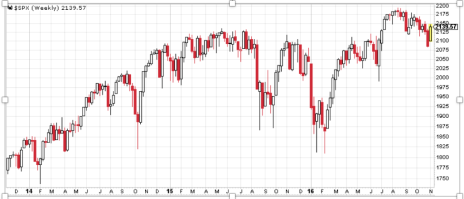Do you prefer growth stocks or value stocks? If you don’t know, now is the time to decide. I’ll explain in a minute. But first, let’s set the stage by talking about the current investment climate…
Investors have been skeptical about stocks in general in 2016, with cash flowing out of equity mutual funds at record rates. In one week in October, U.S. equity funds experienced $16 billion in redemptions.
Given the turmoil caused by a surprise win for Brexit supporters in Britain, uncertainty about when the U.S. Federal reserve might raise rates and a divisive and bitter presidential election campaign, it’s not surprising that investors sought to lower their exposure to stocks. The August/September dips in the S&P 500 Index in 2015 and the even steeper January/February 2016 corrections took the heart out of many investors.
But taking a closer look at the chart will also show that, despite the volatility, the general trend of the S&P is still up. In fact, the S&P has been advancing (with a few sizable corrections thrown in) since March 2009.
Now, with Britain’s actual divorce from Europe subject to legal challenge and long-term negotiations, the U.S. election over and general consensus that the Fed will raise rates by a quarter point in December, the stage would seem to be set for a rebound in equities. Quarterly earnings have been generally good, unemployment is at multi-year lows and real income is on the increase.
So I would say it’s time for you to consider becoming an equity investor.
If you’ve already been around the equity block a few times, getting back in is as easy as renewing your online brokerage account and shipping some capital into it.
But if you’re really new to the game, you have one big decision to make before you ever get anywhere near a Buy button. And that’s deciding whether you’re a growth investor, a value investor or an income investor.
Growth stocks, value stocks and income stocks are three different animals. While the well-diversified portfolio includes all three, most investors lean one way or the other. So which type of investor are you?
Here’s a handy guide to help you make the decision.
Growth investors like to put their money into stocks that are going up. They seek to make money by assembling a concentrated portfolio (ten or twelve stocks) and counting on strong performance from two or three of them to provide the bulk of their gains for the year.
Growth investors need a fairly high risk tolerance, because growth stocks are volatile by definition, and can move quickly.
Growth investors also need a fair amount of discipline, because the only way to make money in volatile stocks is by selling losers while losses are still small. A loss of 10% or 15% in one stock won’t do much damage. But holding a losing stock while it heads lower and lower can quickly take a chunk out of any winners you may hold. The general rule is: Let Winners Run, Cut Losers Short.
Value investors are attracted by stocks that are in the cellar and represent big bargains in terms of the ratio of their stock price to their annual earnings (the famous P/E ratio you’ve probably heard about).
Value stocks are bought at a discount to the actual value of the company and are held for as long as it takes to achieve their fair value. This can take as long as a year or two, but value investors are happy to be patient in exchange for less volatility.
Income investors, sometimes called “buy and hold” investors, are looking for stocks with attractive dividends and stock prices that are at least stable, and ideally moving slowly higher. An income investor who buys a stock at a lower price earns increasing dividends as the stock price rises.
Income investors are often retirees who want money to live on while maintaining the value of their portfolios in the long run. There are fewer decisions to make with income stocks, and the ideal income stock is steady and predictable, with good management, a stable market position and increasing cash flow that can fund a rising dividend rate.
Cabot Wealth has investment advisories for all three styles, growth, value and income, plus small cap stocks and options trading.
But the investing style preferences seem to be built into our personalities at a very deep level. You need to put in some serious introspection and self analysis before you jump in. (Our website has a quiz that will get you started on the process.)
But remember, the most important thing for you to understand about investing in stocks is yourself. All the learning about companies and markets and technical indicators and fundamentals won’t do you a bit of good unless you know your own strengths and weaknesses.
Cabot is a fabulous source of good ideas, market timing indicators, hot stocks and cool commentary. But the real road to investing victory lies inside you. Remember that you can always ask us for help.
[author_ad]

